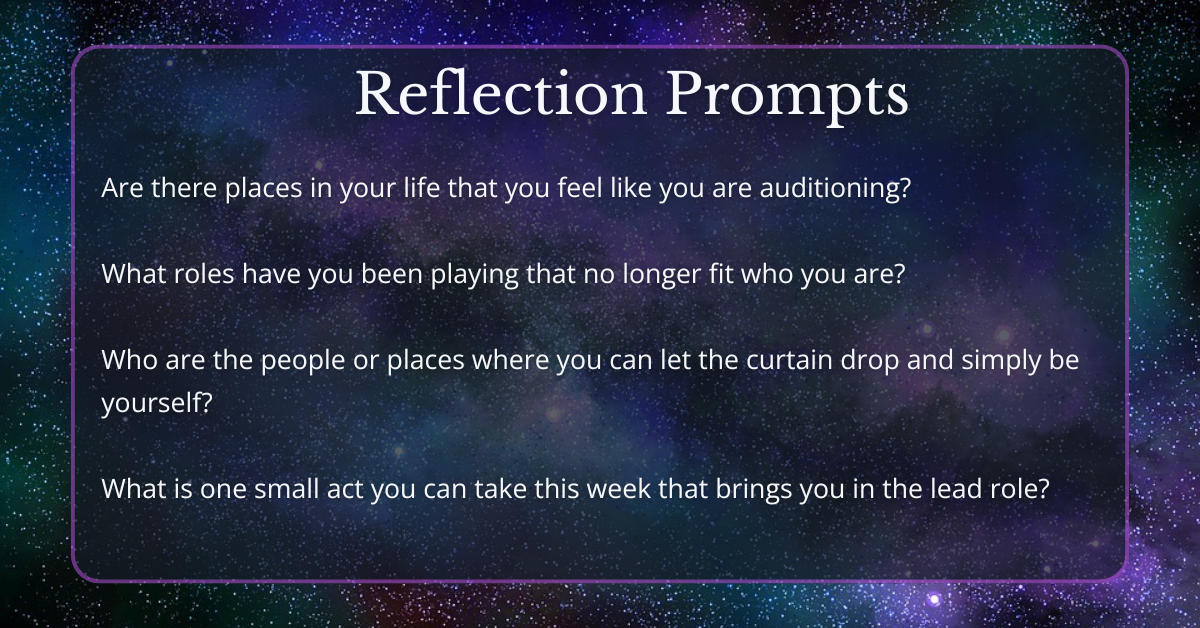When the Audition Ends: Unmasking Neurodivergence
"Galaxy-themed background with white text inside a rounded box. Title reads 'Reflection Prompts.' Below are four questions: Are there places in your life that you feel like you are auditioning? What roles have you been playing that no longer fit who you are? Who are the people or places where you can let the curtain drop and simply be yourself? What is one small act you can take this week that brings you into the lead role?"
Masking and Neurodivergence
For many neurodivergent people, life can feel like one long audition. You are always rehearsing, always checking cues, always making sure you are giving the “right” performance for the audience around you. This is masking: the often invisible effort to hide, minimize, or reshape your neurodivergent traits so you will be accepted.
But for me, unmasking started before I even knew the word “masking.”
Several years ago, I decided in one particular relationship that I would stop performing. I did not have language for neurodivergence yet, and I was not consciously thinking about “masking.” What I thought I was doing was simply refusing to “be manipulative.” That choice, to not hide and to not perform, set off an unexpected evolution.
Instead of focusing on how I was perceived, I started asking myself why I did anything at all. Why I responded the way I did. Why I carried myself the way I did. Slowly, without even knowing it, I was beginning to unmask. It was not until about four years into this process that I realized what I had been doing all along.
What Is Masking?
Masking is when a person consciously or unconsciously suppresses their natural way of being in order to fit into social expectations.
An autistic person might rehearse eye contact, mimic gestures, or force themselves to smile.
Someone with ADHD might hold back from blurting thoughts, manage their body language in ways that feel unnatural, or keep quiet when their brain is racing.
Others may push down stimming, fidgeting, or the need to move just to appear “normal.”
At its root, masking often develops because the world tells us who we are is too much, too loud, or too different.
The Complexity of Masking
Masking is not one thing that happens in one place. It shifts depending on the environment. At work, you might mask to appear “professional.” At home, you might mask to avoid conflict. With friends, you might mask to be easier to love.
Looking back, I can see how often I abandoned myself to show up for others. My needs felt unimportant, so I silenced them. My emotions felt too much, so I hid them. The message I carried was simple: who I really was did not deserve space.
This is the quiet violence of masking. It is not just about hiding traits. It is about the way we learn to treat ourselves as secondary in order to meet the demands of the world around us.
The Costs of Masking
Masking helps people get by, but it takes a toll. Research shows a strong link between long-term masking and:
Burnout and exhaustion. Constant performance leaves little energy for anything else.
Mental health challenges. Anxiety, depression, and even suicidality are more common among those who mask heavily.
Identity confusion. After years of performance, it can be hard to know who you are without the mask.
The world might see you as “high-functioning,” but inside you may feel hollowed out.
The Hidden Strength Behind Masking
It is important to acknowledge something: masking is also a sign of incredible skill. To mask, you have likely learned to:
Read people deeply.
Adapt quickly to environments.
Carry a high level of emotional awareness.
These are powerful abilities. The problem is not that you developed them. The problem is that you have had to overuse them in order to survive.
Beyond the Mask
Unmasking does not mean throwing away your hard-won skills or refusing to adapt ever again. It means reclaiming choice. Instead of playing a role because you have to, you get to decide when, where, and with whom you share your authentic self.
Think of it as moving from being an actor in someone else’s script to becoming the writer, director, and producer of your own story.
Galaxy-themed background with white text inside a rounded box. Title reads 'Reflection Prompts.' Below are four questions: “Are there places in your life that you feel like you are auditioning? What roles have you been playing that no longer fit who you are? Who are the people or places where you can let the curtain drop and simply be yourself? What is one small act you can take this week that brings you into the lead role?"
Closing
Masking may have helped you survive, but it is not the only role available to you. What might happen if you moved from performer to playwright, from audience pleaser to author of your own story?
References
Hull, L., Petrides, K. V., Allison, C., et al. (2017). "Putting on My Best Normal": Social Camouflaging in Adults with Autism Spectrum Conditions. Journal of Autism and Developmental Disorders, 47(8), 2519–2534.
Cage, E., & Troxell-Whitman, Z. (2019). Understanding the Reasons, Contexts and Costs of Camouflaging for Autistic Adults. Journal of Autism and Developmental Disorders, 49(5), 1899–1911.
Livingston, L. A., Shah, P., & Happé, F. (2020). Compensatory strategies below the behavioural surface in autism: a qualitative study. The Lancet Psychiatry, 7(9), 746–757.
Botha, M., Dibb, B., & Frost, D. M. (2020). "Autism is me": The impact of identity, community, and social support on the mental health of autistic people. Journal of Autism and Developmental Disorders, 50(7), 2870–2883.


